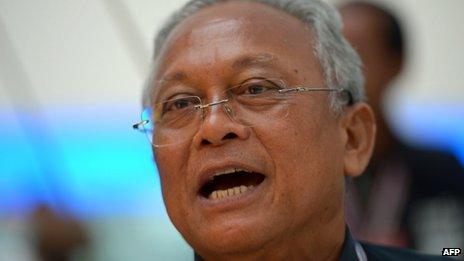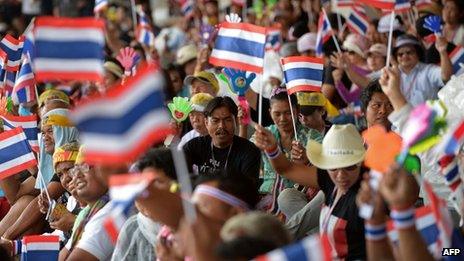Profile: Suthep Thaugsuban and Thailand's protesters
- Published

Suthep Thaugsuban has been in politics for more than 30 years
Suthep Thaugsuban, a former Thai deputy prime minister, resigned from the opposition Democrat Party to lead protests aimed at dislodging Thailand's government.
The man described in a leaked US cable as a "backroom deal-maker" served as deputy to former PM Abhisit Vejjajiva from 2008-2011.
It was their administration that authorised a crackdown on anti-government street protests by supporters of ousted leader Thaksin Shinawatra in Bangkok in 2010.
More than 90 people, mostly civilian protesters, died over the course of the two-month action. Both Mr Suthep and Mr Abhisit face what they call politically-motivated murder charges over the deaths.
In 2013, when Prime Minister Yingluck Shinawatra's government mooted a controversial political amnesty bill, Mr Suthep quit the Democrat Party to lead protests.
Critics said the bill would let Mr Thaksin - who is also Ms Yingluck's brother - return to Thailand without facing jail for corruption charges.
"I realised that once the Yingluck government came to power, it would try to whitewash the wrongdoings of former premier Thaksin Shinawatra," he told Thai newspaper The Sunday Nation.
'People's council'
Mr Suthep has wielded power and influence in the Democrat Party for decades, serving as both agriculture and communication minister.
He has come under fire during his political career before, most notably in 1995 when he was accused of giving the rich land rights under a land reform programme meant for the poor. The fall out led then-PM Chuan Leekpai to dissolve parliament.

The anti-government protesters are strongly opposed to Mr Thaksin
In 2010, when Mr Suthep was deputy prime minister, the government signed off security operations allowing the military to use force to disperse the pro-Thaksin red-shirt protesters occupying key parts of Bangkok.
But in the wake of the violence, a government of Mr Thaksin's allies - led by his sister - was elected, and Mr Suthep found himself back in opposition.
It was the Yingluck government's proposed political amnesty bill that provided the trigger for the protests. Opponents said it was intended to facilitate the return of Mr Thaksin to Thailand.
Mr Suthep stepped down from politics to launch what he has described as protests to wipe out the "political machine of Thaksin".
Mr Suthep led demonstrators who surrounded and occupied government buildings, while urging them to stay non-violent.
As to his goal, he wants the government replaced with an unelected "people's council" to pick the country's leaders.
"Foreigners may think that if the government wins in parliament, that means the majority of the people support them - but the fact is that this government bought votes with their money and corrupted the last election," he said.
The protesters following him tend to be urban and middle class voters, who are particularly concentrated in the capital and the south.
Many are critical of Ms Yingluck's government spending, including an expensive rice subsidy scheme that has helped farmers in rural areas - traditional supporters of Mr Thaksin and his allies - but has hurt Thailand's exports.
The demonstrators are also strongly opposed to Mr Thaksin.
"I hate her government because they're dishonest. They spend our money, our tax money on Shinawatra businesses and their networks," said one protester.
"I want justice and we need democracy for the people. If the government is good, we would want them to continue to administer the country but they are not good," said another.
Many of them have voiced concerns similar to those expressed by anti-Thaksin "yellow-shirt" protesters who closed Bangkok's main international airport in 2008.
Mr Suthep told reporters: "The people will quit only when the state power is in their hands."
He added: "If we don't succeed, then I am prepared to die in the battlefield."